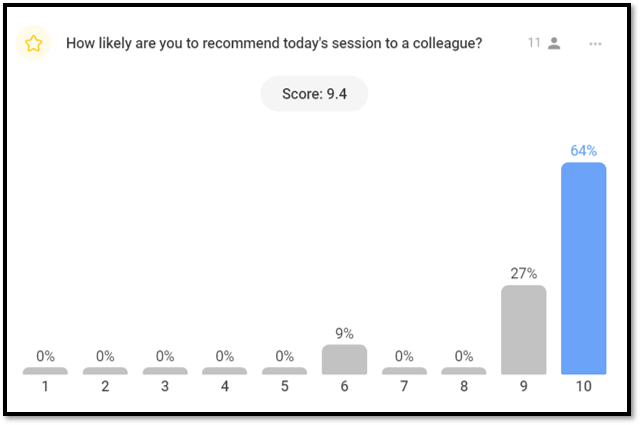One metric to rule them all
What is the North Star metric for your business? We share ours here.
"Learner advocacy is my North Star metric"
That's a lot of consulting jargon in just 7 words. Let me explain what I mean. Behind the jargon is a powerful concept.
Learner advocacy - simply put, would the clients we spend most time with recommend us to someone else?
North Star metric - the single most important number for any business. The one thing that, if it improves, moves you closer to what you're trying to achieve.
In this post I'm going to break down why Learner Advocacy matters to me, how I measure it, and also get under the skin of what drives it (something I'm still learning).
Your business will also have a North Star metric. It probably won't be the same as mine unless you have a very similar business. If you can figure out what it is, measure it, and start to improve it then you'll move faster towards your ambition. This isn't the only thing that matters - you need to measure other things too - but improving your North Star metric should take a larger share of your energy.
💡
A North Star metric is the single most important number for your business. Focusing on it has a major impact on your success.
My core business is helping boutique consulting firms develop their people. The core of this core is our training delivery. We typically run firm-specific courses with 6 - 12 learners in a cohort.
Most of our "client interaction" time is spent with our learners. They are rarely the people engaging us or paying our invoices, but they are hugely important to us. We care a lot about them having a great experience - and not just because of the nice warm fuzzy feeling of a job well done (although I do like that too!). We care about their experience because it drives our growth.
With business growth, numbers matter. The number that matters most for us is Learner Advocacy. We measure this with a simple & well-known question:
"How likely are you to recommend today's session to a colleague?"
You've seen variations of that question everywhere. It originates from Fred Reichheld at Bain & Company, my old consulting firm, who devised the Net Promoter System for driving growth through customer advocacy. Fred wrote the book on this from his research which showed that companies with stronger customer advocacy than their competitors grew faster, made more profit, and earned higher return on capital. For now, you just need to know that scores of 9 or 10 are the only ones that indicate someone will advocate for you - that they'll act as a Promoter of your service. Anything less translates at best as, "Meh - it's ok".
We simply ask this question in a Sli.do poll at the end of our sessions. It takes <1 minute to gather responses from everyone who attended. We also ask it again in a deeper feedback survey ~1 week after the course has completed, where we can dig into some of the detail that sits underneath the headline metric. More on that later.
I believe Learner Advocacy is central to our growth as it gives us three things:
Repeat business
New Leads
Conversion
1. Repeat Business. Repeat business is the lifeblood of any services business. We typically get engaged by the firm owner, or an HR or Talent team leader. They want to invest in their team, and help them develop new ways of doing things. They care, a lot, about how their teams experience our courses and what they get from them. When their teams recommend us we often get booked in for a new cohort of learners from the same firm. In short - Learner Advocacy creates Repeat Business.
2. New Leads. When I look at our pipeline of new clients, 75% of them came from a referral - someone saying, "You should talk to Honeycomb". Why would someone recommend us, with enough confidence that it makes someone to get in touch? Most of the time this comes from someone who has had a great experience with us previously (or knows someone who has - a second order referral). Ultimately, Learner Advocacy brings New Leads.
3. Conversion. When I added testimonials into our proposal decks we suddenly jumped to over 90% proposal acceptance rates. Learners having had a great experience is the key source of testimonials. We collect them in our post-course feedback surveys, and then follow-up with the most passionate advocates. New clients engaging us for the first time want confidence that their teams will have a great experience. No better way to show that than with recent, relevant testimonials from people who are strong promoters. So, Learner Advocacy supports Conversion.
💡
By focusing on our single North Star metric we drive repeat business, new leads, and conversion. Pretty important things if you're trying to grow a services business of any kind.
You need to know what your North Star metric is. And you need to measure it regularly. However, just measuring the right number isn't enough - you need to get under the skin of what drives it so you can actively improve it.
This can be harder to unpick but without it you are just hoping this critical metric will move in the right direction. And I prefer to be more systematic in figuring out what drives improvement.
Through more detailed surveys, 1-2-1 feedback calls with learners, and our own post-delivery reflections we've identified five things that seem to be key to strong Learner Advocacy (remember we want learners to choose 9 or 10 in response to the question about how likely they are to recommend us).
In order of importance here are those five things. We find that learners need to feel that their experience was:
Relevant
Clear
Accessible
Practical
Fun
Relevance is about how well the content relates to what they do day-to-day, and also to their level of consulting experience. As our courses are sold centrally people are often told they need to attend. They aren't always choosing to be there. As such sometimes we end up with people who the content isn't perfectly relevant for. If someone doesn't feel the content is relevant to them you've already lost them, and we often find that they will score us 8 or lower. Maximising relevance is about content, preparation, and also getting the right trainers in the room.
Clarity is key to their understanding. I've been surprised at how high the bar for clarity is. We cover complex concepts and we have to work very hard to get each concept, and the relationships between them, crystal clear. I like to introduce gamification elements - mystery, challenge and intrigue - into our training, but if that leads to a lack of clarity it can have a net negative impact. This is a key thing I've learnt recently.
Accessibility relates to learning styles and how our content is introduced to people. I'm embarrassed to say that, despite having an autistic daughter and now also suspecting that I'm autistic myself, this is not something I'd considered much until recently. I had my eyes opened last week during a session I was delivering.
I was facilitating a group of 9 learners in a two-day in-person Core Consulting Skills course. I could see one of the girls in the group was showing increasing signs of anxiety as she was struggling to follow what I was saying. I checked in with her during one of the exercises. She said that she had challenges processing auditory information (she literally couldn't understand what I was saying) and as a result was feeling lost and stressed. She asked if I could give her written notes to follow instead. So simple, but a massive enabler of her learning - and no doubt would help many others. For her, we'd failed to make our content accessible enough.
Practicality is all about leaving people feeling able to put things into practice, immediately. The days of learning being a tick-box exercise or just a fun day out are long gone. People demand things that will help them straight away. And those paying our invoices want to see that their investment is getting results.
Finally, we come to Fun. It's fair to say I have over-emphasised this in the past, bringing in mysteries, challenges, and unexpected twists & turns in an effort to make our training super-engaging. Those things are all great but need to be the icing on the cake of an experience that is relevant, clear, accessible and practical. They might take a 9 rating to a 10. But getting it wrong and leaving learners feeling confused is a sure fire way to turn that 9 into a 6 instead.
I'm still learning about what drives Learner Advocacy. We are now directly measuring these 5 elements and will be looking at correlations with our Net Promoter Scores. I'm sure we'll uncover lots more nuance to respond to.
We have clarity on our North Star metric. We've implemented a simple, reliable way of measuring it consistently. We're learning about the underlying drivers so we can iterate to improve it.
I think we're on the right path. The journey continues.
Thank you for reading! There are several other ways you can interact with us….
Connect with Deri Hughes on LinkedIn
Connect with Colin Mann on LinkedIn
Book a 30 minute intro call with Deri Hughes
Stay informed about our free workshops and webinars - follow Honeycomb on LinkedIn or visit our website.






